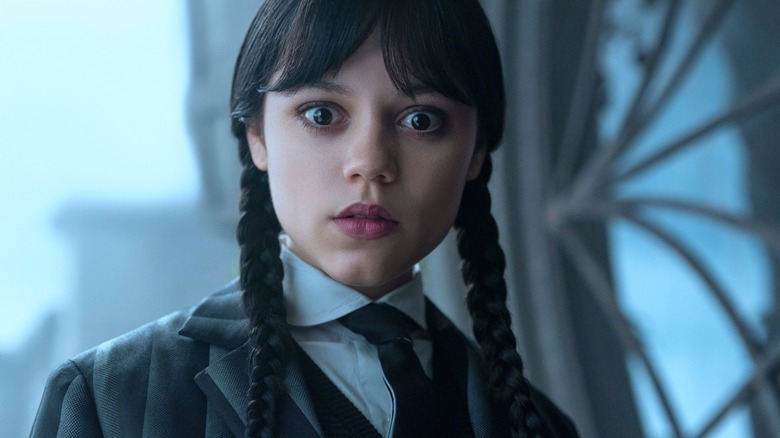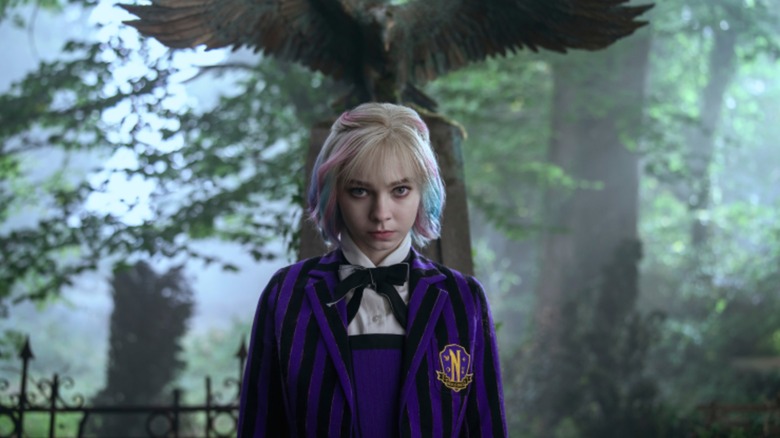The Subtle Stephen King Influence At The Heart Of Netflix's Wednesday
Al Gough and Miles Millar's "Wednesday" has forged its own identity while staying true to what "The Addams Family" franchise has always stood for. What's more, Tim Burton's enthusiastic involvement has shaped the show's tone and aesthetic, where the gothic gloom of gargoyles and graveyards is often contrasted against bright, pop hues to subvert expectations. "Wednesday" engages our interest by taking a beloved group of characters and situating them in a time-tested YA setting — the protagonist enrolling in a fantastical boarding school brimming with eccentric characters. Nevermore Academy might remind you of Hogwarts or Camp Half-Blood, but Millar insists that while these parallels might seem inevitable, the true inspiration behind "Wednesday" stems from popular tropes in Stephen King's works (via The Hollywood Reporter):
"We've always loved the genre [YA] and 'Harry Potter' and 'Percy Jackson', certainly, but, for us, Stephen King and Tim Burton [were the inspirations], because Tim wasn't on the project when we first started it and created it. The Stephen King element of small towns and teenage emotions run rampant felt like the elements that [we went for], and then ['The Addams Family' cartoonist] Charles Addams, so those things were really what inspired us. It wasn't any homage to 'Percy Jackson' or anything like that, or 'Harry Potter', but as soon as you get to boarding school, the comparisons are there."
This makes sense, as superficial parallels can easily be drawn between Nevermore and any fictional magical school, where everything from Xavier's School for Gifted Youngsters ("X-Men") to Brakebills University for Magical Pedagogy ("The Magicians") might appear to fit the bill. The Stephen King influence, however, is deliberately woven into the show's DNA and how it brings the small, eerie town of Jericho to life.
Jericho consciously mimics every mysterious small town in Stephen King's stories
King's horror-driven stories are mostly set in small towns that emerge as characters in their own right, as these spaces take on a liminal quality that conveys unease. Perhaps the most persistent example of this is Derry, Maine (featured in "It," "Insomnia," and "11/22/63"), but King also imbues a supernatural quality to places like Chester's Mill or Castle Rock, where the veneer of quaint normalcy is disrupted by something horrifying. Jericho seems to be modeled after this sentiment: it appears to be a lush, sleepy town that wears its odd secrets on its sleeve, but hides a hideous underbelly that has claimed the lives of innocent teenagers for decades. Season 2 cements this with its big reveal about L.O.I.S., along with the fact that magically gifted at Nevermore are no match for the forces of evil that lurk in the shadows.
Millar also mentions emotionally volatile teen characters in King's works — the Losers Club from "It" obviously comes to mind, but there's also Gordie LaChance from "The Body," who revisits the frustrations/turmoils of his teen years in this earnest coming-of-age novella. "Wednesday" can also be viewed through the coming-of-age lens, as it dramatizes teenage growing pains in a world attuned to the supernatural, where every heightened emotion is further exacerbated by Jericho's liminality. Wednesday (Jenna Ortega) might seem immune to this predicament, but her aloof, stand-offish nature hides deep vulnerability for those she cares about. Moreover, Wednesday is still evolving as a teenager on the fringes of societal expectation — a true outcast among Outcasts — which puts her in a unique position with respect to the events in the show.
Hopefully, there will be more Stephen King-inspired influences in the upcoming third season of "Wednesday."

